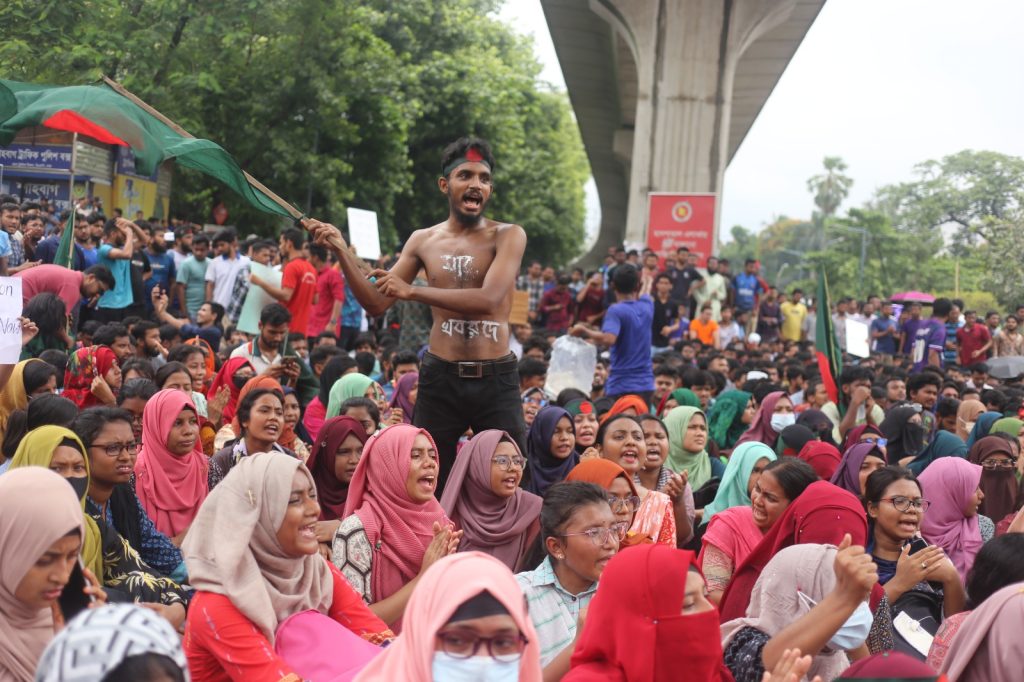Gulistan, one of the capital’s busiest locations, was brought to a standstill on July 14, 2024, as the students continued their protests for another day. Beginning their march from Shahbagh, they made their way toward Bangabhaban, the President’s official residence.
But they never reached it.
Obstructed by heavy police barricades and over a hundred officers in riot gear, the students staged a sit-in protest, refusing to retreat. Among them was a 12-member delegation, set to hand over a memorandum demanding urgent reform to the government’s controversial quota system in public sector jobs. The delegation included movement leaders like Sarjis Alam, Nahid Islam, and Hasnat Abdullah, who had become household names by then.
Their demand was clear: an emergency parliamentary session within 24 hours to pass legislation ensuring a logical and fair reform to the decades-old quota system, which they argued had become a tool of nepotism and inequality.
“If the government had intervened from the beginning,” said Nahid Islam after submitting the memorandum, “the movement would not have escalated. But they chose silence. So we came to the President.”
What should have been a democratic handover of demands quickly spiraled into something darker. As protesters peacefully demonstrated, the state pushed back harder—with surveillance, arrests, and legal threats mounting daily. On the same morning, the day that changed it all forever Supreme Court lawyer Khandaker Hasan Shahriar sent a legal notice seeking a ban on rallies, meetings, and processions on all days except Fridays. The notice labeled protests as a source of “public suffering,” echoing the government’s growing narrative of delegitimizing youth dissent.

Then came what many now call the movement’s most defining—and damning—moment, a chilling display of state indifference.
On the afternoon of July 14, Prime Minister Sheikh Hasina—already under immense pressure—made international headlines. But not for addressing the turmoil at home. She issued a statement condemning the attempted assassination of former US President Donald Trump, which had occurred just a day earlier during a campaign rally in Pennsylvania, USA, calling it “a tragic event in a civilized, democratic nation.” There was no mention of her own young citizens being injured, arrested, or killed in the streets of Dhaka.
That same day, responding to journalists on the quota controversy, Hasina dismissed the protesters’ demands with a single sentence that would come to symbolize her government’s downfall, “If the grandsons of freedom fighters are not given this opportunity, will the grandsons of Razakars be entitled to it?”
It was a moment of historical pain turned into political weaponry, alienating not just the students but a wide swath of the population. The implication was clear: to question the status quo was to question the liberation war’s legacy. Many saw the remark as not only insensitive, but also dangerously divisive—reviving the ghosts of a civil war to silence today’s youth.
By nightfall, social media exploded. Protesters printed Hasina’s quote onto placards, denouncing her for equating dissent with treason. Hashtags like #WeAreNotRazakars and #ReformNotRevenge began trending across platforms. Even former allies within the ruling party expressed unease at her tone.
What followed in the coming weeks was unprecedented. The government-imposed internet blackouts, filed digital security cases against student leaders, and deployed plainclothes agents. Violence escalated, with at least 17 protesters confirmed dead by human rights groups, hundreds injured, and many more detained without charge.
But the resistance didn’t stop. Instead, it grew stronger, more organized, and more intergenerational. Elderly freedom fighters, academics, and even members of the civil service began to voice support. For the first time in over a decade, cracks appeared in Hasina’s political stronghold.
A month later, under mounting pressure and facing international criticism, Sheikh Hasina stepped down. It marked the end of an era—and the beginning of a new chapter in Bangladesh’s democratic journey.
July 14, 2024 is now remembered not just as a day of protest—but as the day a generation demanded dignity and accountability. And refused to be silenced.

